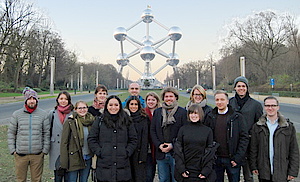Report on the IACM field trip to Brussels
December 2016
On the first day, the group had a full-day visit at the European Commission. After an introduction on the role of the Commission as the political executive of the European Union, representatives of different units of the European External Action Service (EEAS) presented their work. The talks covered EU peace support operations in Mali, the EU Rule of Law Mission in Kosovo (EULEX) and the EU’s activities and policies with regard to the conflict in and around Ukraine.
The IACM students were able to critically discuss EU policies and to learn about remaining obstacles and problems concerning the EU’s current programmes and its foreign policy goals. The students also had the opportunity to put theoretical concepts from their study background into perspective with the (working) experiences of EU officials and other practitioners. In the end of the visit, the students were given an overview over the employment opportunities at the European Commission and respective recruitment processes for EU civil servants.
On the second day, unfortunately, the planned visit at the International Organization for Migration was cancelled on a very short notice. Due to this programme shift the group spontaneously decided to visit the Parlamentarium – the official exhibition of the European Parliament where students could learn about the history of European integration and the functioning of the European Parliament. The appointment at the United Nations Regional Information Center (UNRIC) was opened by a general presentation on the structure and functioning of the United Nations and on the content of the United Nation’s 17 “Sustainable Development Goals.” This general introduction was followed by a personal and very interesting account on the experiences one of the officials collected during his work with the United Nations in Afghanistan.
On the next day, the students were welcomed at the Regional Office of the UN High Commissioner for Refugees (UNHCR). After an introductory quiz about UNHCR, the two representatives of the office presented the latest UNHCR proposals on how to rebuild trust among states through better management of the current refugee crisis. Additionally, they explained their personal career paths and how they found employment with UNHCR.
Afterwards the students were introduced to the work of the International Crisis Group (ICG), a non-governmental non-profit organisation that conducts field research on ongoing violent conflicts. Through their field reports and policy recommendations the ICG seeks to influence policy makers to contribute to the prevention and resolution of armed conflicts.
The last appointment was arranged with NATO headquarters where a German representative spoke about the present (political) challenges for NATO in the areas of international security and crises management. Current topics such as the crisis in Ukraine and the resulting tensions with Russia as well as recent political developments such as the 2016 presidential elections in the United States and the political situation in Turkey were discussed with regard to their (potential) impact on NATO.
On the way back to Konstanz the group had a closing discussion which ended with a very positive feedback and the expressed wish to uphold the tradition of the annual IACM field trips for following generations of IACM students.
Joschka J. Proksik, coordinator of the IACM Master’s programme
Nina Hänjes, IACM student and coordination assistant
